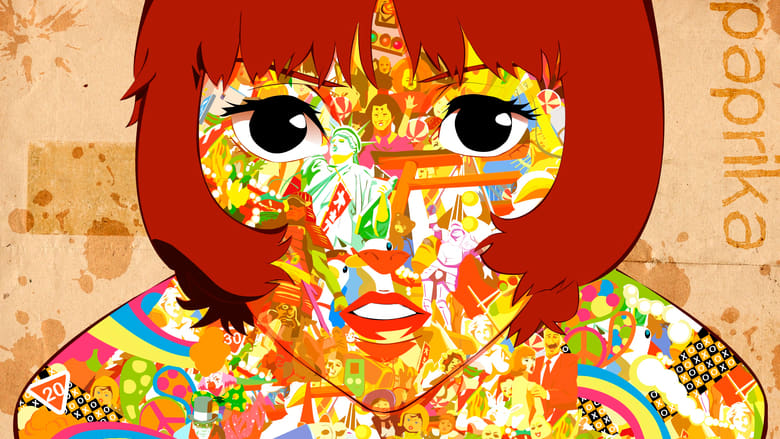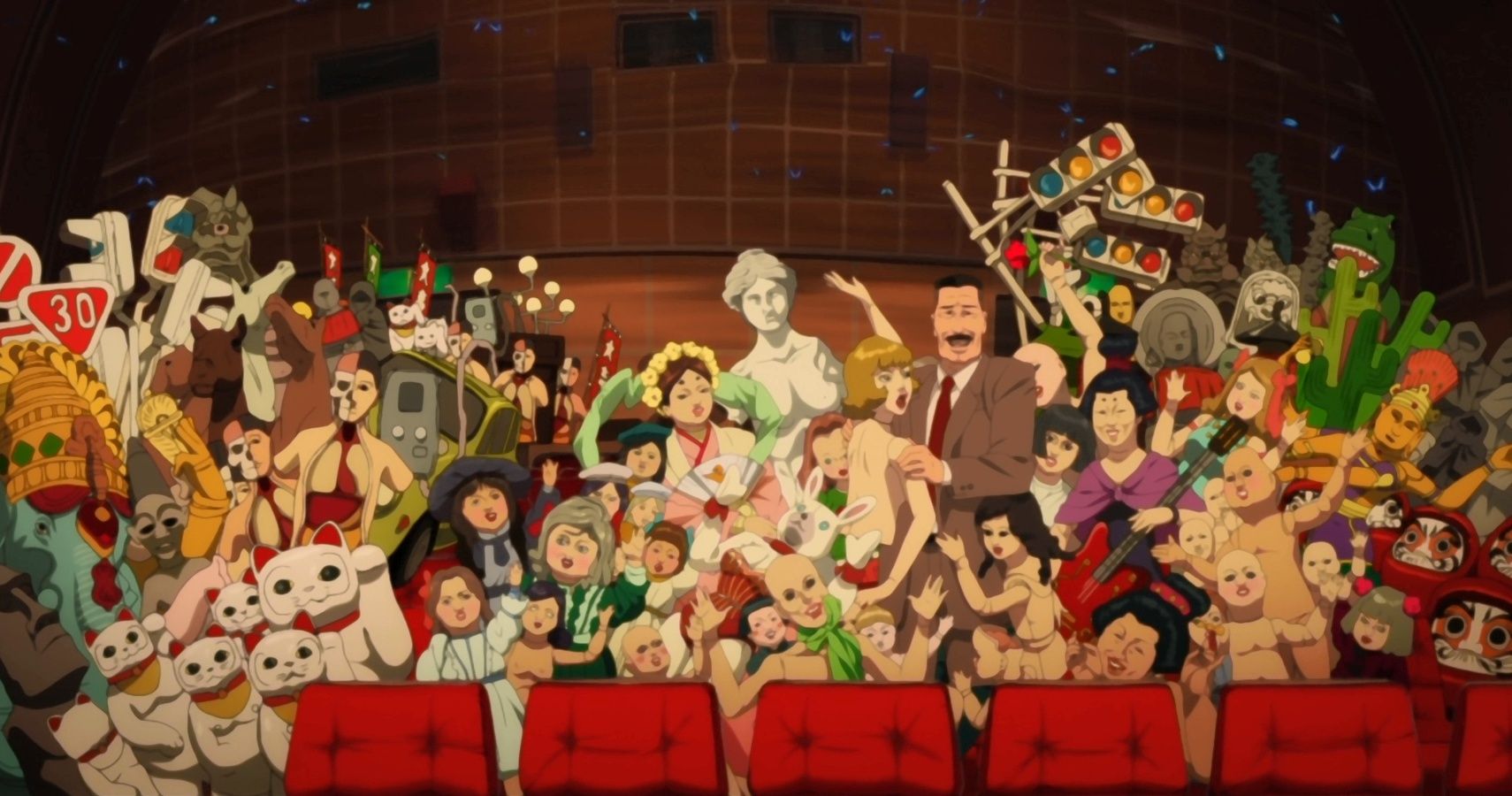← Back to Reviews

in
Paprika (2006)

In the near future scientists have developed the Mini DC, a technology allowing a person to view or even step inside of another's dreams. When the senior Doctor begins spouting complete nonsense and leaps out of a window it is discovered that someone has stolen a Mini DC and intends to terrorize the public with it.
To be honest, I almost did not want to review this just yet. I feel like I need to gather my thoughts with a second viewing, but I'm going to give it a shot anyway. This movie is just unreal and I can't believe it has taken me so long to watch it. It's tempting to compare it to the movie that was inspired by it, Inception, but they are actually two very different movies doing very different things. Where Inception is a fairly straight-forward action film revolving around gaining intelligence from unaware dreamers, Paprika is a big emotional ball of repressed feelings and secret desires doubling as a love-letter to cinema. Take for example Detective Toshimi Konakawa who is being given psychiatric help from Paprika secretly: Early on we find out that Toshimi adamantly does not like movies, but over the course of the film we discover this man contains an usual amount of film knowledge. My favorite showcase of this knowledge is when he is explaining to Paprika what "breaking the axis" means while wearing the same hat that was iconic on Akira Kurosawa. What this shows is that not only does he have detailed knowledge of film production, but also fanboyish knowledge of a famous director. By the climax of the movie we learn that Konakawa has been repressing his love for film because he is saddened that he stopped pursuing a career in it after his friend, and filmmaking partner passed away. And this is only one example of many throughout the picture.
The film is a big emotional release. When everyone's emotions and desires are laid bare waltzing the city streets, we the audience feel a sort of release as well. This feeling is underscored by the film's music. There is a very specific song that is unleashed whenever the chaotic dream parade comes out in full force, and this track really emphasizes the whole movie's point. It is this chaotic carnival of instruments that somehow manages to be both foreboding and relieving, almost comforting? How the hell did Susumu Hirasawa even manage that? It's ****ing impressive. Is it possible to get this on Vinyl? Because I want it. Visually this film really exemplifies what animation can offer as an artform. The way in which Paprika and others hop from dream to dream is not only pleasing to the eye, but also accurate to the very nature of dreaming. I've always found it amazing how natural it feels to completely switch locations within my own dreams, like going from trying to find my seat grade 8 science to driving through a busy street completely nude. These sequences in Paprka are so well done in how familiar they feel to us, even if recalling our dreams can be difficult.
There is a ton to unwrap in this film and this little review, for me, doesn't quite feel sufficient. Like I said, I really want to watch this again soon. I supposed when I get right down to it what really stuck with me was the feeling it gave me when the closing credits came up. Relief. Like a huge weight was taken off of my shoulders. The fact that this film made me feel this emotion to the extent that I imagine is close to the same level as the characters within the film were feeling it, is one hell of an achievement.

In the near future scientists have developed the Mini DC, a technology allowing a person to view or even step inside of another's dreams. When the senior Doctor begins spouting complete nonsense and leaps out of a window it is discovered that someone has stolen a Mini DC and intends to terrorize the public with it.
To be honest, I almost did not want to review this just yet. I feel like I need to gather my thoughts with a second viewing, but I'm going to give it a shot anyway. This movie is just unreal and I can't believe it has taken me so long to watch it. It's tempting to compare it to the movie that was inspired by it, Inception, but they are actually two very different movies doing very different things. Where Inception is a fairly straight-forward action film revolving around gaining intelligence from unaware dreamers, Paprika is a big emotional ball of repressed feelings and secret desires doubling as a love-letter to cinema. Take for example Detective Toshimi Konakawa who is being given psychiatric help from Paprika secretly: Early on we find out that Toshimi adamantly does not like movies, but over the course of the film we discover this man contains an usual amount of film knowledge. My favorite showcase of this knowledge is when he is explaining to Paprika what "breaking the axis" means while wearing the same hat that was iconic on Akira Kurosawa. What this shows is that not only does he have detailed knowledge of film production, but also fanboyish knowledge of a famous director. By the climax of the movie we learn that Konakawa has been repressing his love for film because he is saddened that he stopped pursuing a career in it after his friend, and filmmaking partner passed away. And this is only one example of many throughout the picture.
The film is a big emotional release. When everyone's emotions and desires are laid bare waltzing the city streets, we the audience feel a sort of release as well. This feeling is underscored by the film's music. There is a very specific song that is unleashed whenever the chaotic dream parade comes out in full force, and this track really emphasizes the whole movie's point. It is this chaotic carnival of instruments that somehow manages to be both foreboding and relieving, almost comforting? How the hell did Susumu Hirasawa even manage that? It's ****ing impressive. Is it possible to get this on Vinyl? Because I want it. Visually this film really exemplifies what animation can offer as an artform. The way in which Paprika and others hop from dream to dream is not only pleasing to the eye, but also accurate to the very nature of dreaming. I've always found it amazing how natural it feels to completely switch locations within my own dreams, like going from trying to find my seat grade 8 science to driving through a busy street completely nude. These sequences in Paprka are so well done in how familiar they feel to us, even if recalling our dreams can be difficult.
There is a ton to unwrap in this film and this little review, for me, doesn't quite feel sufficient. Like I said, I really want to watch this again soon. I supposed when I get right down to it what really stuck with me was the feeling it gave me when the closing credits came up. Relief. Like a huge weight was taken off of my shoulders. The fact that this film made me feel this emotion to the extent that I imagine is close to the same level as the characters within the film were feeling it, is one hell of an achievement.
